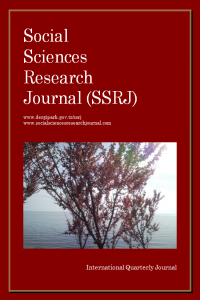The Renewable Energy Consumption-Economic Growth Nexus in Turkey
Energy consumption, Renewable energy, Economic growth;, Nonlinear Granger causality
___
- Adams, S., Klobodu, E. K. M., & Apio, A. (2018). Renewable and non-renewable energy, regime type and economic growth. Renewable Energy, 125, 755-767.
- Apergis, N., & Payne, J. E. (2010). Renewable energy consumption and economic growth nexus: Evidence from a panel OECD countries. Energy Policy 38, 656-660.
- Apergis, N., & Payne, J. E. (2011). Renewable energy consumption-growth nexus in Central America. Applied Energy, 88, 343-347.
- Apergis, N., & Payne, J. E. (2012). Renewable and nonrenewable energy consumption-growth nexus: Evidence from a panel error correction model. Energy Economics, 34, 733-738.
- Apergis, N., & Danuletiu D. C. (2014). Renewable energy and economic Growth: Evidence from the sign of panel long-run causality. International Journal of Energy Economics and Policy, 4 (4), 578-587.
- Apergis, N., & Payne, J. E. (2009). Energy consumption and economic growth in Central America: Evidence from a panel cointegration and error correction model. Energy Economics, 31, 211-216.
- Balcılar, M., Ozdemir, Z. A., Ozdemir, H., & Shahbaz, M. (2018). The renewable energy consumption and growth in the G-7 countries: Evidence from historical decomposition method. Renewable Energy, 126, 594-604.
- Brock, W., W. Dechert, and J. Scheinkman (1996). A test for independence based on the correlation dimension. Econometric Reviews 15, 197–235.
- Cowan, W. N., Chang, T., Inglesi-Lotz, R., & Gupta, R. (2014). The nexus of electricity consumption, economic growth and CO2 emissions in the BRICS countries. Energy Policy, 66, 359-368.
- Diks, C. G. H., & Panchenko, V. (2006). A new statistic and practical guidelines for nonparametric Granger causality testing. Journal of Economic Dynamics and Control, 30 (9-10), 1647-1669.
- Esso, L. J. (2010). Threshold cointegration and causality relationship between energy use and growth in seven African countries. Energy Economics 32, 1383-1391.
- Hiemstra, C., & Jones, J. D. (1994). Testing for linear and nonlinear Granger causality in the stock price‐volume relation. The Journal of Finance, 49 (5), 1639-1664.
- Koçak, E., & Şarkgüneşi, A. (2017). The renewable energy and economic growth nexus in Black Sea and Balkan countries. Energy Policy, 100, 51-57.
- Menegaki, A. N. (2011). Growth and renewable energy in Europe: A random effect model with evidence for neutrality hypothesis. Energy Economics, 33, 257-263.
- Narayan, S., & Doytch, N. (2017). An investigation of renewable and non-renewable energy consumption and economic growth nexus using industrial and residential energy consumption. Energy Economics, 68, 160-176.
- Naseri, S. F., Motamedi, S., & Ahmadian, M. (2016). Study of mediated consumption effect of renewable energy on economic growth of OECD countries. Procedia Economics and Finance, 36, 502-509.
- Republic of Turkey Ministry of Energy and Natural Resources, 2015-2019 Strategic Plan, https://www.enerji.gov.tr/en-US/Strategic-Plan (May, 2019).
- Republic of Turkey Ministry of Energy and Natural Resources, Electricity, https://www.enerji.gov.tr/en-US/Pages/Electricity#:~:text=The%20gross%20electricity%20consumption%20in,was%20303%2C2%20billion%20kWh.&text=By%20the%20end%20of%20the%20first%20half%20of%202019%2C%20the,1%2C7%25%20other%20sources. (June 2020).
- Ocal, O., & Aslan, A. (2013). Renewable energy consumption-economic growth nexus in Turkey. Renewable and Sustainable Energy Reviews, 28, 494-499. Ozturk, I. (2010). A literature survey on energy-growth nexus. Energy Policy, 38, 340-349.
- Shahbaz, M., Loganathan, N., Zeshan, M. & Zaman, K. (2015). Does renewable energy consumption add in economic growth? An application of auto-regressive distributed lag model in Pakistan. Renewable and Sustainable Reviews, 44, 576-585.
- World Bank, Data, https://data.worldbank.org/indicator/NY.GDP.PCAP.CD?locations=TR&view=chart, (May, 2020).
- Yayın Aralığı: Yılda 4 Sayı
- Yayıncı: Denta Florya ADSM Limited Company
Evli Bireylerde Bağlanma Stillerinin Depresyon Üzerindeki Etkisinin İncelenmesi
Buşra KARLIOĞLU, Hanifi PARLAR
Ayetler ve Hadisler Işığında Evlilik ve Boşanma Sürecine Psikolojik Bakış
The Renewable Energy Consumption-Economic Growth Nexus in Turkey
Burak GÜRİŞ, Burcu YAVUZ TİFTİKÇİGİL
Üniversite Öğrencilerinin Aşk Stillerinin Evlilik Tutumları Üzerindeki Etkisinin İncelenmesi
Üniversitedeki Kız Öğrencilerin Özgüven Düzeyleri ve Etkileyen Faktörler
Türk Gençlik Yazın Türünde Bilim Kurgu Türü: ‘Barış Müstecaplıoğlu’’nun Osmanlı Cadısı Adlı Eseri
İmalat Sanayisine Kısa Bir Bakış
Enflasyon Yakınsamasının Fourier Birim Kök Testleri ile İncelenmesi: Kırılgan Beşli Örneği
